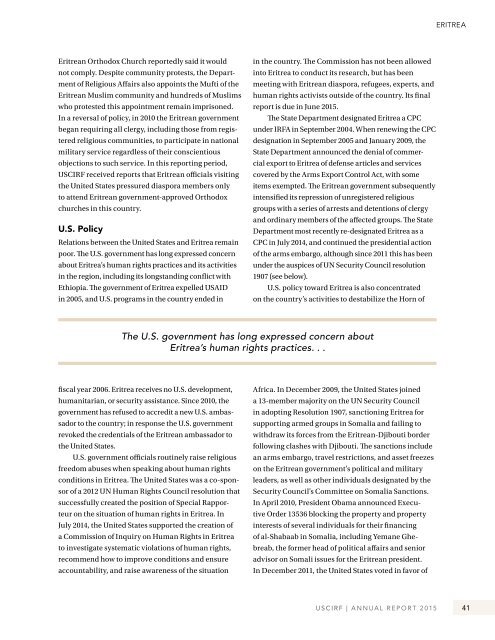USCIRF Annual Report 2015 (2)
USCIRF Annual Report 2015 (2)
USCIRF Annual Report 2015 (2)
You also want an ePaper? Increase the reach of your titles
YUMPU automatically turns print PDFs into web optimized ePapers that Google loves.
ERITREA<br />
Eritrean Orthodox Church reportedly said it would<br />
not comply. Despite community protests, the Department<br />
of Religious Affairs also appoints the Mufti of the<br />
Eritrean Muslim community and hundreds of Muslims<br />
who protested this appointment remain imprisoned.<br />
In a reversal of policy, in 2010 the Eritrean government<br />
began requiring all clergy, including those from registered<br />
religious communities, to participate in national<br />
military service regardless of their conscientious<br />
objections to such service. In this reporting period,<br />
<strong>USCIRF</strong> received reports that Eritrean officials visiting<br />
the United States pressured diaspora members only<br />
to attend Eritrean government-approved Orthodox<br />
churches in this country.<br />
U.S. Policy<br />
Relations between the United States and Eritrea remain<br />
poor. The U.S. government has long expressed concern<br />
about Eritrea’s human rights practices and its activities<br />
in the region, including its longstanding conflict with<br />
Ethiopia. The government of Eritrea expelled USAID<br />
in 2005, and U.S. programs in the country ended in<br />
in the country. The Commission has not been allowed<br />
into Eritrea to conduct its research, but has been<br />
meeting with Eritrean diaspora, refugees, experts, and<br />
human rights activists outside of the country. Its final<br />
report is due in June <strong>2015</strong>.<br />
The State Department designated Eritrea a CPC<br />
under IRFA in September 2004. When renewing the CPC<br />
designation in September 2005 and January 2009, the<br />
State Department announced the denial of commercial<br />
export to Eritrea of defense articles and services<br />
covered by the Arms Export Control Act, with some<br />
items exempted. The Eritrean government subsequently<br />
intensified its repression of unregistered religious<br />
groups with a series of arrests and detentions of clergy<br />
and ordinary members of the affected groups. The State<br />
Department most recently re-designated Eritrea as a<br />
CPC in July 2014, and continued the presidential action<br />
of the arms embargo, although since 2011 this has been<br />
under the auspices of UN Security Council resolution<br />
1907 (see below).<br />
U.S. policy toward Eritrea is also concentrated<br />
on the country’s activities to destabilize the Horn of<br />
The U.S. government has long expressed concern about<br />
Eritrea’s human rights practices. . .<br />
fiscal year 2006. Eritrea receives no U.S. development,<br />
humanitarian, or security assistance. Since 2010, the<br />
government has refused to accredit a new U.S. ambassador<br />
to the country; in response the U.S. government<br />
revoked the credentials of the Eritrean ambassador to<br />
the United States.<br />
U.S. government officials routinely raise religious<br />
freedom abuses when speaking about human rights<br />
conditions in Eritrea. The United States was a co-sponsor<br />
of a 2012 UN Human Rights Council resolution that<br />
successfully created the position of Special Rapporteur<br />
on the situation of human rights in Eritrea. In<br />
July 2014, the United States supported the creation of<br />
a Commission of Inquiry on Human Rights in Eritrea<br />
to investigate systematic violations of human rights,<br />
recommend how to improve conditions and ensure<br />
accountability, and raise awareness of the situation<br />
Africa. In December 2009, the United States joined<br />
a 13-member majority on the UN Security Council<br />
in adopting Resolution 1907, sanctioning Eritrea for<br />
supporting armed groups in Somalia and failing to<br />
withdraw its forces from the Eritrean-Djibouti border<br />
following clashes with Djibouti. The sanctions include<br />
an arms embargo, travel restrictions, and asset freezes<br />
on the Eritrean government’s political and military<br />
leaders, as well as other individuals designated by the<br />
Security Council’s Committee on Somalia Sanctions.<br />
In April 2010, President Obama announced Executive<br />
Order 13536 blocking the property and property<br />
interests of several individuals for their financing<br />
of al-Shabaab in Somalia, including Yemane Ghebreab,<br />
the former head of political affairs and senior<br />
advisor on Somali issues for the Eritrean president.<br />
In December 2011, the United States voted in favor of<br />
<strong>USCIRF</strong> | ANNUAL REPORT <strong>2015</strong> 41


